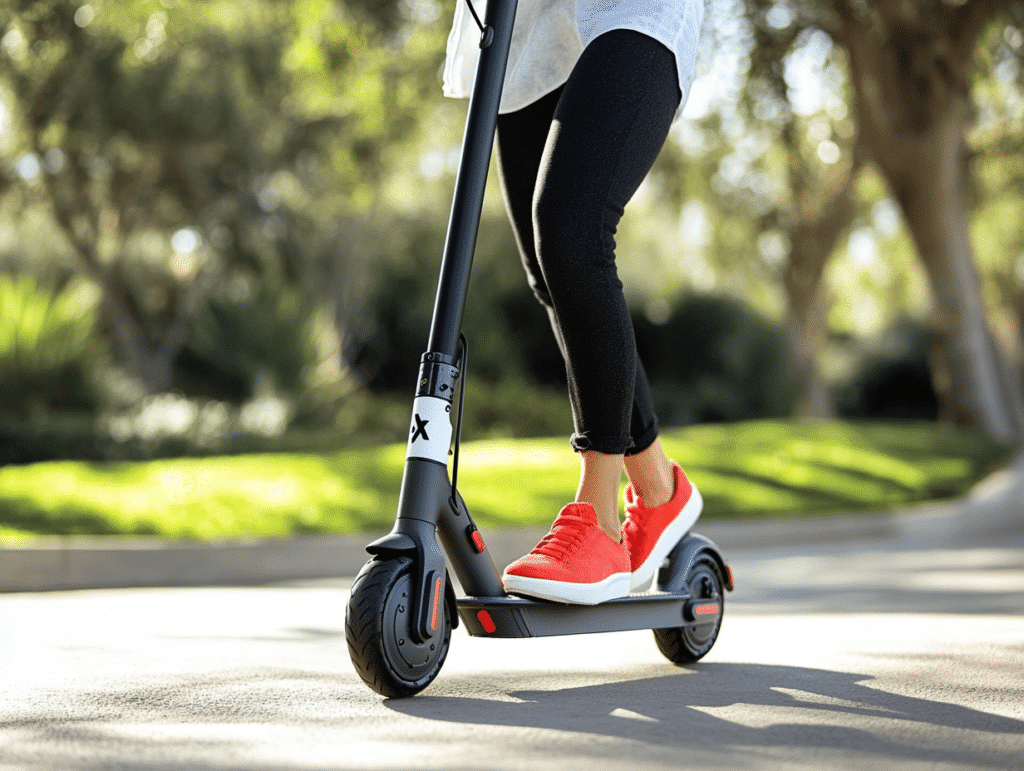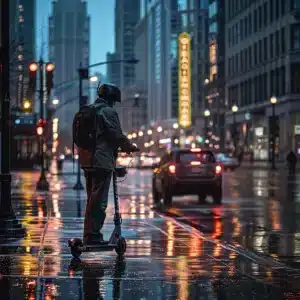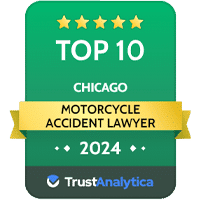Key Takeaways
- Scooter riders in Illinois must have a Class L or M license, register their scooters, and maintain liability insurance, with specific equipment requirements for road legality.
- Electric scooters are categorized as ‘low-speed vehicles’ with varied regulations, and while no special license is needed for rental e-scooters, Chicago requires registration and a $50 sticker.
- In case of a scooter accident, it is vital to seek medical attention, file a police report, gather evidence, document the incident fully, and consider consulting a personal injury attorney.
Your search for help ends here. Let’s get started, for FREE.
Understanding Illinois Scooter Laws
In the Land of Lincoln, scooters are officially classified as motor-driven cycles. This classification brings with it certain requirements for riders, which are outlined in the Illinois moped laws. To legally ride a scooter in Illinois, one must possess a Class L or M license, register the scooter, and maintain liability insurance. These obligations are not mere formalities; they are integral parts of the Illinois Vehicle Code designed to ensure the safety of all road users.
Scooters in Illinois must also be equipped with specific gear to be road-legal. This includes a headlight visible from 500 feet, a taillight visible from 100 to 600 feet, and eye protection or a windshield. This gear is designed to increase your visibility to other road users and protect you from potential hazards on the road.
Knowing what to do in case of a scooter accident is also crucial. If your scooter is involved in an accident resulting in significant property damage or injuries, you should report the incident to local law enforcement as soon as possible.
This ensures the incident is properly documented and can assist in any potential insurance or legal matters that may arise.
Licensing Requirements for Scooters
Obtaining a current valid driver’s license is a fundamental requirement for scooter riders in Illinois. However, not all licenses are created equal when it comes to operating a scooter. Those with larger engines require a Class L or M license. This is because these types of scooters are considered motor-driven cycles under the Illinois Vehicle Code.
Interestingly, if your scooter has a motor smaller than 750W and is equipped with fully functional pedals, you’re in luck. You do not need to be licensed or insured to operate such vehicles in Illinois. But remember, this exemption applies only to scooters with smaller engines and functional pedals. For all other scooters, a current valid driver’s license is non-negotiable.
Registering Your Scooter
Just like any other motor vehicle, scooters need to be registered in Illinois. This process includes paying an associated fee and obtaining a rear-facing license plate. It’s worth noting that this requirement applies to all scooters, including mopeds, a type of scooter known for its unique design and lower speed limits.
This registration process ensures that your scooter is legally recognized and traceable by the authorities. This can be particularly useful in the event of a theft or accident. So, make sure you register your scooter to stay on the right side of the law.
Insurance Requirements for Scooters
Insurance plays a crucial role in scooter riding in Illinois, just as car insurance does for drivers. State law requires scooter riders to carry liability insurance with minimum coverage limits. The limits for bodily injury are set at $25,000 per person and $50,000 per accident. Additionally, the limit for property damage is set at $25,000. These coverage limits are designed to protect both riders and other road users in the event of an accident.
While uninsured motorist coverage is not mandated by Illinois law, it is generally recommended for added protection. This type of coverage can provide financial relief if you’re involved in an accident with a driver who doesn’t have insurance or whose insurance is insufficient to cover the costs of the accident. As of 2021, all-electric scooter riders in Illinois are required to have their scooters properly registered in addition to carrying liability insurance. Motorcycle insurance, although not explicitly mentioned, can offer similar benefits to scooter riders.
Electric Scooter Regulations in Illinois
The rise of electric scooters has prompted Illinois to establish specific laws governing their use. These futuristic machines are divided into different categories based on size, and interestingly, no special licensing is required for their riders. This classification aligns with the National Highway Traffic Safety Administration’s designation of electric scooters as ‘low-speed vehicles’.
In the Prairie State, electric scooter riders are allowed to use public roads. However, local municipalities may enforce additional restrictions. This means that while you can enjoy the thrill of speed on the open road, you must also be mindful of any local rules and regulations that may apply in your area.
When it comes to rental electric kick-scooters from services like Bird and Lime, there is good news for riders. There is no need to possess special licensing to operate these scooters in Illinois. So, if you’re in town for a visit or just want to try one out for fun, you can do so without worrying about additional licensing.
Licensing and Registration
Just as with traditional scooters, electric scooter riders in Illinois are required to have a valid license. The type of license required is a Class M or L license. These licenses ensure that riders have the knowledge and skills necessary to safely operate these vehicles on public roads.
In addition to having a valid license, electric scooter riders in Chicago must also register their scooters and obtain a $50 registration sticker. This requirement ensures that your scooter is legally recognized, and it also contributes to the funding of infrastructure and services that support scooter riders in the city.
Safety Equipment and Helmet Laws
Despite the fun and convenience that electric scooters offer, safety should never be compromised. It’s interesting to note that there are no helmet laws for electric scooter riders in Illinois. However, protective gear like eye protection is required by the state. These requirements are designed to protect riders from potential hazards and to enhance visibility on the road.
While there’s no state-wide helmet mandate, municipalities in Illinois may have their requirements for electric scooters, which are categorized along with bicycles. For instance, Chicago has set rules for shared electric scooter systems, which include helmet usage, age limitations, and prohibition of sidewalk riding. Always check the local laws in your area to ensure you comply with all safety requirements.
Injured in a Scooter Accident?
Scooter Laws Within Chicago
Scooter riding in the Windy City comes with its own unique set of rules. One of these is the requirement for scooter riders in Chicago to purchase an annual motorbike sticker, which costs $48. This sticker is a legal requirement, ensuring that your scooter is registered and legal to operate within the city limits.
In addition to the sticker requirement, scooters are prohibited from riding on sidewalks and must adhere to bike lane rules when available. The city also restricts the use of scooters in certain parts of the city, such as on the Lakefront Trail, where it is currently banned.
Violating these rules can lead to stiff penalties. Fines for scooter law violations in Chicago can range up to $500. Therefore, understanding and complying with the city’s unique laws is not just a matter of safety, but it can also save you from unnecessary financial burdens.
City Motorbike Stickers
The city motorbike sticker is a key requirement for scooter riders in Chicago. All riders are required to purchase this sticker to legally operate on city streets. This requirement applies to all moped riders utilizing Chicago streets, whether or not they reside within the city limits.
At a cost of approximately $48 annually, the city motorbike sticker is a small price to pay for the freedom to navigate the bustling streets of Chicago on your scooter. Remember, riding without this sticker could result in a hefty fine, so it’s worth the investment.
Riding Restrictions and Local Ordinances
Chicago has specific rules for scooter usage. Some of these rules include:
- Scooters may only be rented between 5:00 am and midnight
- Riders need to be at least 18 years old, or 16 with parental consent
- Riding scooters on the Lakefront Trail, The 606 (Bloomingdale Trail), or the Chicago Riverwalk is prohibited
These restrictions ensure the safety of both scooter riders and other road users.
There are also specific rules for smaller e-scooter companies wanting to operate in the city. They can do so provided they have at least 2,000 scooters and a year’s track record of successful operation in a U.S. city with a population of over 1 million. Furthermore, a new licensing fee for e-scooter providers in Chicago is set at $250,000 for two-year agreements, payable upfront, with additional monthly service fees per scooter ride.
Tips for Safe Scooter Riding in Illinois
Riding a scooter can be an exhilarating experience, but safety should never take a backseat. Understanding and adhering to traffic laws is crucial for reducing the risk of accidents and avoiding potential penalties. This means being aware of speed limits, traffic signals, and right-of-way rules.
In addition to understanding the rules of the road, getting to know your scooter’s controls and inspecting it for any damage before riding is essential. The popularity of electric scooters and mopeds in the Windy City and surrounding areas necessitates heightened awareness and safety measures among riders.
Proper Protective Gear
Safety should always be your top priority when riding a scooter. Wearing appropriate protective gear is crucial for scooter riders in Illinois to ensure safety. Helmets, in particular, are highly recommended for riders, especially those on e-scooters.
In addition to helmets, extra safety gear such as knee and elbow pads are recommended for less experienced riders to provide extra protection. Remember, the goal is to enjoy the ride while minimizing potential risks and wearing the right gear can go a long way in achieving that.
Defensive Driving Techniques
Defensive driving is a valuable skill for scooter riders, which can be further enhanced through a driver education program. It involves:
- Staying vigilant at intersections
- Maintaining a safe distance from other vehicles
- Utilizing the SEE (Search, Evaluate, Execute) System for enhanced safety.
To further minimize the risk of accidents, riders are advised to:
- Avoid weaving between traffic
- Use bike lanes if possible
- Adhere to the 10 mph speed limit on first trips
- Develop skills in emergency braking and maneuvering, which can be lifesavers on a variety of road surfaces and in changing weather conditions.
Familiarizing Yourself with Local Laws
Every city or municipality may have its own set of rules and regulations governing scooter use, including additional moped laws. Therefore, it’s imperative for riders to actively stay informed on the local laws and regulations that apply to scooter operations in their particular area.
Compliance with local mandates regarding scooter parking and the use of designated riding areas is crucial for legal scooter operations. Familiarizing yourself with local laws not only keeps you out of legal trouble but also ensures a smooth and hassle-free riding experience.
What to Do in Case of a Scooter Accident
Accidents, though unfortunate, can happen to anyone at any time. If you’re involved in a moped accident or a scooter accident in Illinois, it’s important to know what to do. Moped accidents, like any other vehicular accidents, require immediate attention. First and foremost, seek medical attention immediately to treat any injuries and to document them for potential personal injury claims.
After an accident, it’s also imperative to:
- File a police report
- Collect evidence from the scene, including photographs and witness contact information
- Maintain a thorough record of all accident-related expenses
- Keep all receipts and relevant paperwork
These steps are essential for any potential legal proceedings.
Seeking Medical Attention
Your health should always be your priority after a scooter accident. Regardless of how minor you think your injuries might be, it’s crucial to see a doctor immediately. Medical records can play a significant role in personal injury claims, providing evidence of the extent of your injuries and the treatment required.
Even if there are no apparent injuries, seeking medical attention is still advisable. Some injuries may not be immediately apparent and could manifest later. Keeping a record of your medical visits and any treatments received can provide crucial documentation needed for pursuing compensation through legal channels.
Gathering Evidence and Documenting the Scene
Once you’ve sought medical attention, your next step should be to gather as much evidence as possible. This includes:
- Taking photos of the accident scene
- Taking photos of the scooter
- Taking photos of any other vehicles involved
- Taking close-ups of the damage
- Take photos of any relevant road signs or conditions.
Don’t forget to collect contact information from any witnesses. Their accounts of the accident could be crucial in any ensuing legal proceedings. Remember, the more evidence you have, the stronger your case will be if you need to seek compensation for your injuries.
Contacting an Attorney
In the aftermath of a scooter accident, it can be beneficial to consult with a personal injury attorney, especially one who specializes in scooter accidents. An experienced attorney can provide essential guidance on your legal options for seeking compensation for damages related to the accident.
Personal injury attorneys are well-versed in handling insurance company strategies that may involve undervaluing claims or pressuring victims into accepting settlements that are not in their best interest. Consulting with an attorney can help ensure that your rights are protected and that you receive the compensation you deserve.
Frequently Asked Questions
Do I need a special license to ride a scooter in Illinois?
If your scooter has a larger engine, you will need a Class L or M license in Illinois. However, if your scooter has a motor smaller than 750W and has fully functional pedals, no license is required.
Are helmets mandatory for scooter riders in Illinois?
In Illinois, helmet laws for scooter riders are not state-wide, but eye protection is required and local municipalities may have their helmet requirements.
What are the insurance requirements for scooters in Illinois?
In Illinois, scooter riders must have liability insurance with minimum coverage limits of $25,000 for bodily injury per person, $50,000 for bodily injury per accident, and $25,000 for property damage. This is a requirement for riding scooters in the state.
Are there specific scooter laws in Chicago?
Yes, scooter riders in Chicago must purchase an annual motorbike sticker, adhere to bike lane rules, and follow local restrictions such as the prohibition of riding on sidewalks and certain city areas. Be sure to familiarize yourself with these regulations to avoid any issues.
What should I do if I'm involved in a scooter accident?
If you’re involved in a scooter accident, it’s crucial to seek immediate medical attention, file a police report, gather evidence, and consider consulting a personal injury attorney for legal guidance. Take these steps to ensure your well-being and protect your legal rights.














